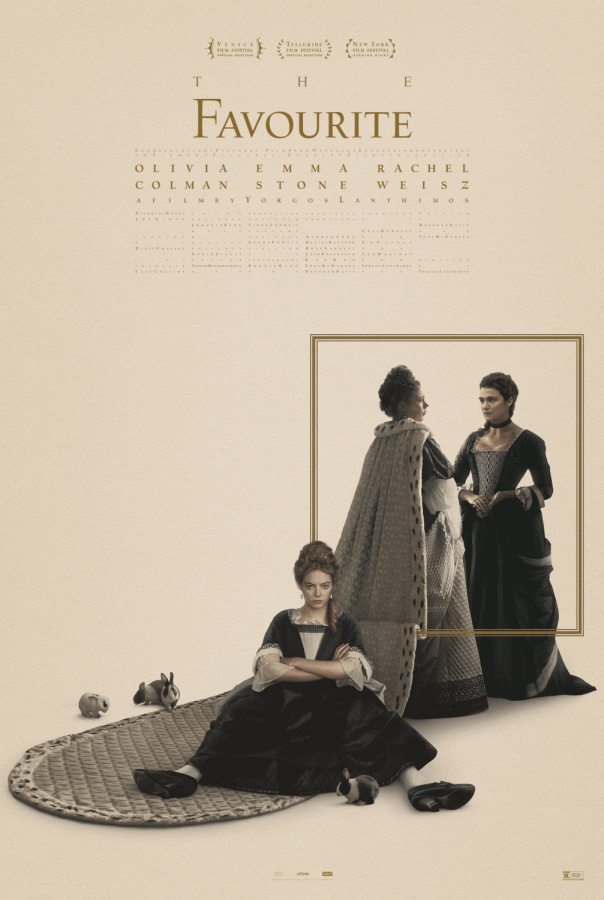Drama Comedy Genre: A New Favorite
When you watch a movie that is labeled as drama-comedy, you don’t know what to expect. Indeed, mood swings seem to be an ever present fear in movies that attempt such a feat. You ask yourself, can a movie really embellish both sides of that coin? Some movies do, but many fail spectacularly; doubly so if that movie is a period piece. And, even more so if the movie is based on a little historical truth.
That is not the case in 2018’s “The Favourite.” Coming out at the end of last year, Yorgos Lanthimos’ “The Favourite” peers back through nearly 300 years of history and finely dances the line between dark introspective drama and crass humour. Abigail Marsham (Emma Stone), a down-on-her-luck woman who has lost nearly everything, goes to seek work from her cousin Sarah Churchill, Duchess of Marlborough (Rachel Weisz). In the meantime, Queen Anne (Olivia Colman) and the court navigate the political mess of ending a war with the French. “The Favourite” focuses on the rivalry between Abigail and Sarah. As Abigail slowly climbs the social ladder, the film asks the question: “How far would you go to win the favor and attention of a monarch?” Why, through her bed sheets, of course!
“The Favourite” absolutely lives in absurdism, and though the film has a pearl of historical truth (Abigail Masham and Sarah Churchill did in fact vie for the Queen’s affection), this movie is mostly rooted in fiction. Most of the humor often arises from the sharp contrast between witty, blunt and modern dialogue and the period-piece drama wherein. You’ll be treated to an impressive view of a splendid feast, when all of a sudden, people start busting some pretty fresh moves. Either way, I caught myself snickering and cringing in delight at many of the scenes.
And the drama? Much like Abigail in her mission for power, the drama progressively intensifies. You’ll be surprised by each twist and turn at the power plays and nastiness between the women. The script, written by Deborah Davis and Tony McNamara, is to die for. It is wonderfully animated, and the acting compliments the script-writing well. While Stone is excellent and daring, and Weisz absolutely chews the scenery, the sensitivity to which Colman plays the justifiably unhinged Queen Anne is gripping.
And yet, the movie pulls no punches with its dedication to representing English life and society in the dawn of the 18th century, from the aesthetic of its costumes to the music. It’s a gorgeous film and a real period piece, but don’t let that (and the humor) deceive you. Though it’s dedicated, it mocks and comments upon the patriarchal society—nearly all of the men are incompetent, foolish and downright dis- gusting (in all senses of the word, I was getting quite queasy during some of the revelries—a testament to Lanthimos’ filmmaking). It’s to the point where sex and subservience to men is played for laughs and Abigail and Sarah so easily weave through society and utterly dominate it from the shadows, so much so that you wonder how the men are even able to run things. And even then, the film mocks the ab- solute power that all the characters hold when they arrive at the top.
Lanthimos and his crew paint in broad strokes regarding historical accuracy—and if it makes for a better movie, who can complain? Just don’t come in expecting a lesson on Queen Anne’s War; rather, sit back and enjoy some of the finest in filmmaking that makes you think to yourself, “I can’t believe that just happened.” The movie has racked up ten Oscar nominations, among them are best picture, script, director, actress (Colman), and supporting actresses (Stone and Weisz), tying it with Alfonsò Cuaron’s Roma (2018). These nominations are just cherries on top of the royal cake that is this excellent and sharp film.
Contact Peter Hager at [email protected].






